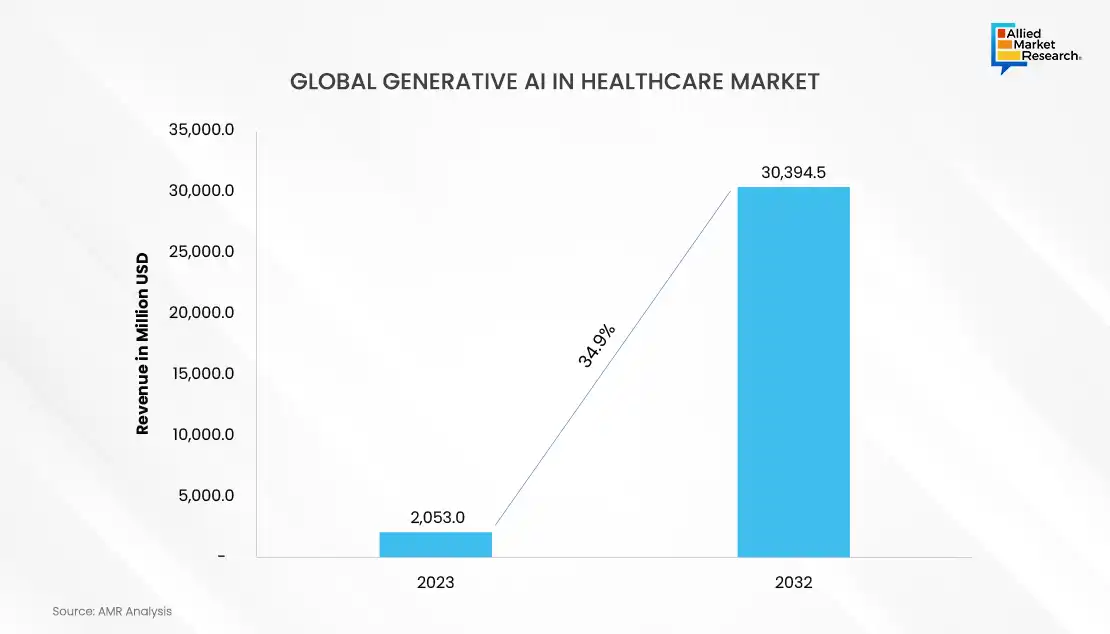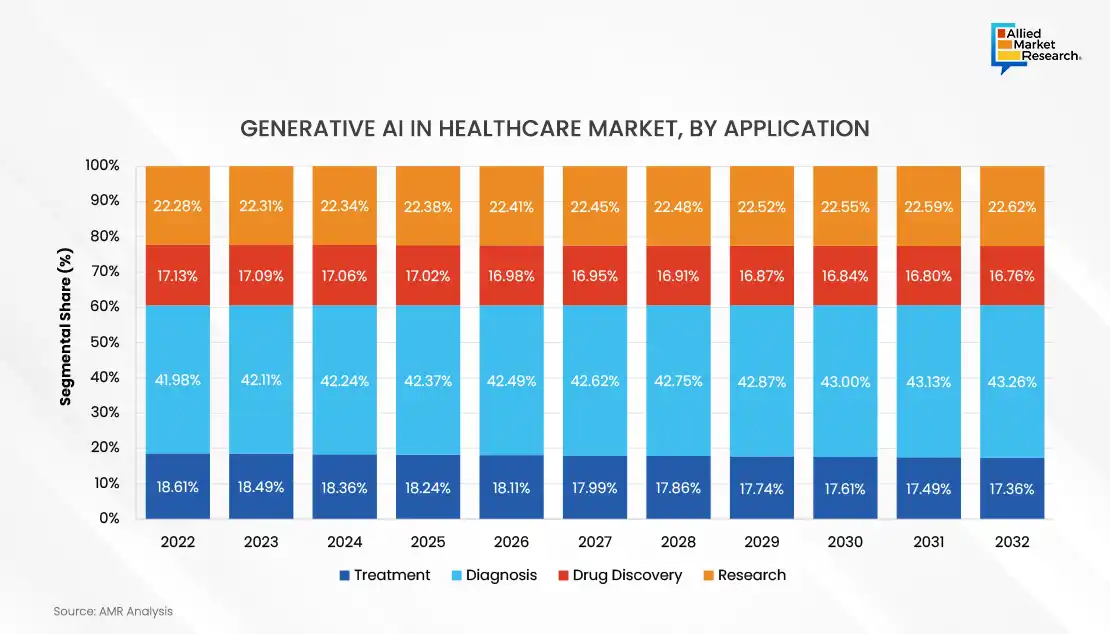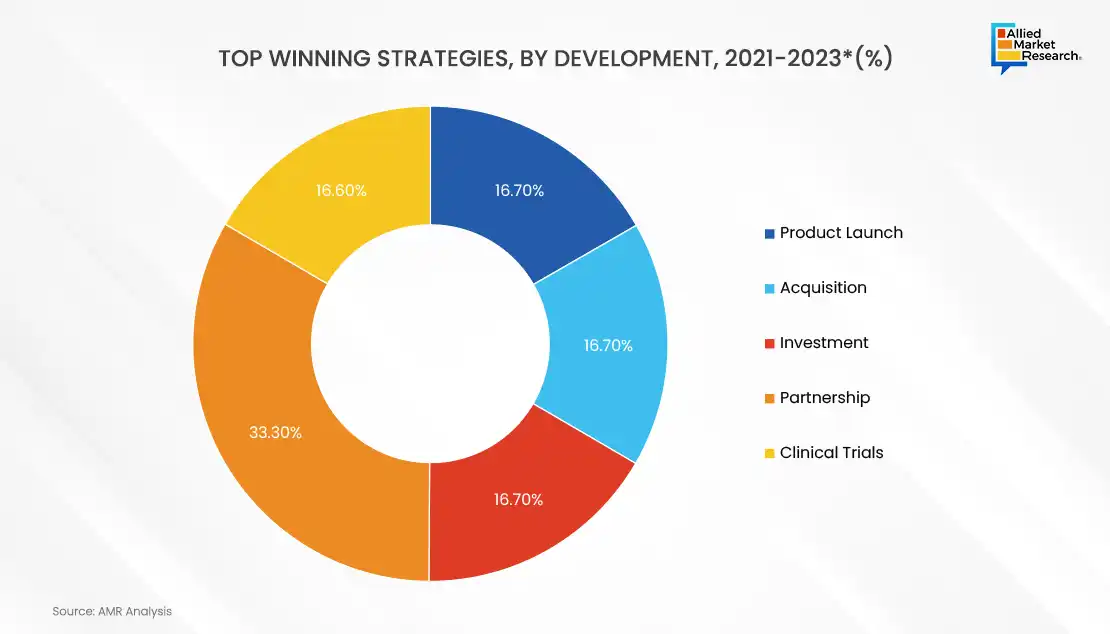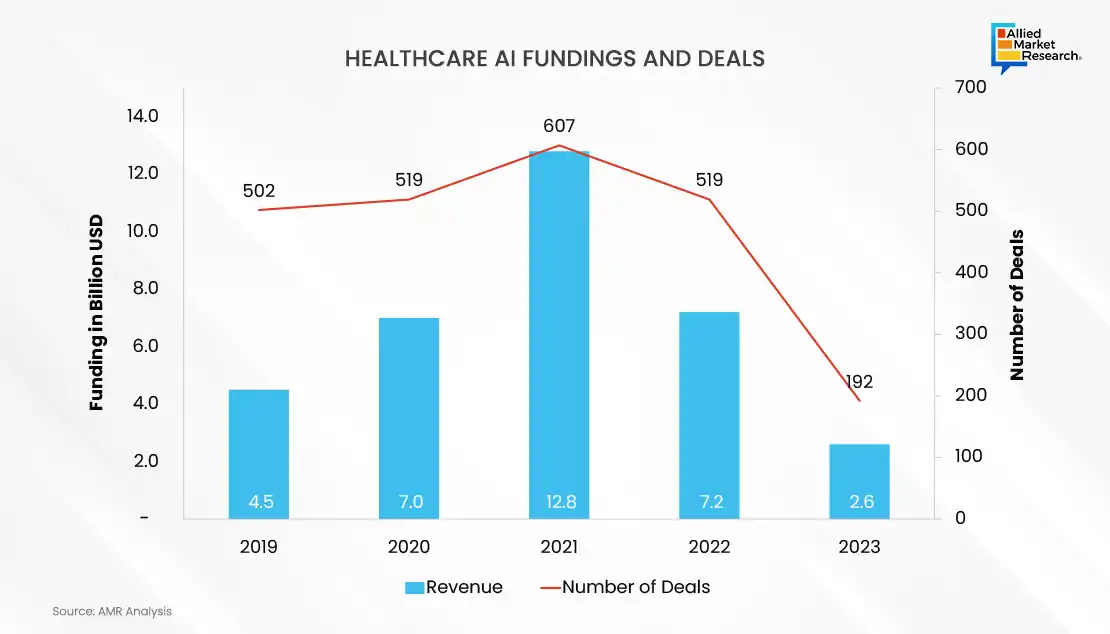Table Of Contents
- Applications of Generative AI in Healthcare
- Playing an important role in the advancement of drug development
- Streamlining medical training and simulation experiences
- Facilitating clinical diagnostic processes
- Streamlining administrative tasks through automation
- Creating artificial medical data
- Future Outlook with Generative AI in Healthcare:
- Factor Impede the market in near future
- The enduring capabilities of generative AI in healthcare
- Conclusion

Roshan Deshmukh

Koyel Ghosh
Revolutionizing Healthcare: The Power of Generative AI

Generative AI has gained significant traction in the field of healthcare, revolutionizing various aspects of patient care, medical research, and administrative processes. This high-end AI technology is being used to predict patient outcomes by generating synthetic patient data that can help researchers better understand disease progression and treatment effects while ensuring patient privacy. In the clinical domain, generative AI assists in medical record summarization and report generation. Natural Language Processing (NLP) models can generate concise and relevant summaries of patients' medical histories, aiding healthcare providers in making more informed decisions. Furthermore, chatbots and virtual assistants powered by generative language models offer support for patients, answering questions and providing information on various healthcare topics.

Applications of Generative AI in Healthcare
Playing an important role in the advancement of drug development
AI is transforming all seven pivotal stages of new drug development, ranging from discovery to screening to optimization. Its integration accelerates drug synthesis and screening by 40% to 50%, potentially leading to annual savings of up to $26 billion compared to traditional methods. Utilizing machine and deep learning, AI simulates drug properties, aiding in the identification of promising compounds. In clinical research, AI not only trims costs by $28 billion per year but also significantly shortens phase durations through task automation and rapid statistical analysis. The increasing incorporation of AI in the pharmaceutical industry not only reduces expenses but also hastens the development of more effective drugs, fostering medical innovations for a healthier global landscape.
The emergence of strategic partnerships between biotech firms and AI startups indicates the early adoption of generative AI within the pharmaceutical industry. For instance, in 2023, Recursion Pharmaceuticals acquired two Canadian AI startups, Cyclica and Valence, for $88 million. Notably, Valence, celebrated for its generative AI capabilities, is positioned to design drug candidates using small datasets that may be inadequate for traditional drug discovery methods.
In a noteworthy instance from the University of Toronto, a research team developed a generative AI system named ProteinSGM, in 2023. This pioneering system uses generative diffusion to create entirely new therapeutic proteins that are not found in nature.
Streamlining medical training and simulation experiences
Generative AI applied in healthcare can produce authentic simulations that replicate a diverse range of health conditions. This enables medical students and professionals to engage in risk-free, controlled practice scenarios. The AI can create patient models with various diseases or simulate medical procedures such as surgeries.
In contrast to traditional training methods with pre-programmed scenarios, which can be limiting, AI offers the advantage of swiftly generating dynamic patient cases. It can adapt in real-time, responding to the decisions made by trainees, thereby fostering a more challenging and realistic learning experience.
For instance, The University of Michigan developed a healthcare-focused generative AI model capable of generating diverse scenarios for simulating the treatment of sepsis.
Similarly, the University of Pennsylvania utilized a generative AI model to simulate the progression of COVID-19 and assess various interventions. This enabled researchers to evaluate the potential effects of measures such as social distancing and vaccination on the spread of the virus.
Facilitating clinical diagnostic processes
Hospitals can utilize generative AI tools to enhance the diagnostic capabilities of traditional AI, transforming low-quality scans into high-resolution medical images. These tools incorporate anomaly detection algorithms and provide detailed results to radiologists.
Early disease detection: Researchers can train generative AI models using medical images, lab tests, and patient data to identify and diagnose various health conditions in their early stages. These models excel in detecting skin cancer, lung cancer, hidden fractures, early signs of Alzheimer's, diabetic retinopathy, and more. Additionally, they can reveal biomarkers associated with specific disorders, predicting disease progression.
Efficient medical inquiries: Medical professionals can turn to generative AI in healthcare to address queries quickly, bypassing the need to consult medical literature. AI algorithms process vast amounts of data, delivering prompt answers and saving valuable time for doctors.
With this , Google's AI-driven Med-Palm 2 underwent training on the MedQA dataset, achieving an 85% accuracy rate in responding to pertinent medical queries. While acknowledging the need for further enhancement, Google recognizes this accomplishment as a robust initiation for generative AI in the role of a diagnostic assistant.
Streamlining administrative tasks through automation
The application stands out as a prominent application of generative AI in healthcare. Research indicates that the burnout rate among physicians in the US has surged to a significant 62%. Physicians experiencing burnout are at a higher risk of being involved in incidents that jeopardize patient safety and are more prone to alcohol abuse and suicidal thoughts.
Fortunately, the introduction of generative AI in healthcare offers partial relief for doctors by automating administrative tasks. This not only eases the workload but also contributes to cost reduction in administration, comprising 15%-30% of total healthcare spending, as reported by HealthAffairs.
In 2023, Nuance Communications, a Microsoft Company, launched Dragon Ambient eXperience (DAX) Express, an automated clinical documentation application integrated into workflows. DAX Express is the first to combine conversational and ambient AI with OpenAI's advanced GPT-4 model. This advancement extends the Dragon Medical portfolio and builds upon the 2020 DAX ambient solution, aiming to reduce administrative burdens for clinicians.
Similarly, in 2023, Navina, a pioneering medical AI startup, developed a generative AI assistant with the explicit goal of optimizing doctors' efficiency in managing administrative responsibilities. This advanced tool possesses the ability to seamlessly access diverse patient data, encompassing Electronic Health Records (EHRs), insurance claims, and scanned documents. It not only furnishes real-time status updates but also offers insightful recommendations for patient care and addresses doctors' queries. Furthermore, the AI assistant exhibits proficiency in generating well-structured documents like referral letters and progress notes.
Creating artificial medical data
Medical research heavily depends on obtaining extensive datasets related to various health conditions. Unfortunately, there is a significant scarcity of such data, particularly concerning rare diseases. Additionally, the collection of such data is a costly endeavor, and its utilization and sharing are restricted by privacy laws.
Generative AI in the medical field offers a solution by creating synthetic data samples. These synthetic datasets can complement real-world health datasets without being bound by privacy regulations, as they do not pertain to specific individuals. Artificial intelligence can generate various forms of medical data, including Electronic Health Records (EHR) and scans.
In 2023, Microsoft and Epic announced that they are enduring a strategic partnership to incorporate generative AI into healthcare. This involves leveraging the extensive capabilities of Azure OpenAI Service1 in conjunction with Epic's top-tier electronic health record (EHR) software.

Emids, a leader in technology-driven solutions for healthcare and life sciences, launched the Generative AI platform 'EPulseAI' for the healthcare industry in 2023. Targeted at all stakeholders in the US healthcare ecosystem, including payers, providers, and tech companies, this platform aims to enhance patient outcomes. As per the company, EPulseAI accelerates product engineering and increases productivity in the healthcare product development lifecycle, potentially achieving efficiency gains of up to 50%.
Future Outlook with Generative AI in Healthcare:
Collaboration between Sectors: Increased collaboration between the healthcare and technology sectors will foster innovation. Partnerships between pharmaceutical companies, technology firms, and research institutions will contribute to the development and deployment of advanced Generative AI solutions.
For instance, Google, Microsoft, and Amazon Web Services (AWS) are leveraging their strengths to collaborate with prominent healthcare and pharmaceutical entities, aiming to integrate cutting-edge technology into the healthcare landscape. As an example, in June 2023, Google Cloud partnered with Mayo Clinic to revolutionize healthcare through Generative AI. Mayo Clinic is set to implement Generative AI to enhance the effectiveness of clinical workflows, to simplify information retrieval for clinicians and researchers. This collaboration aims to expedite access to necessary data, ultimately contributing to improved patient outcomes.
Innovations in Algorithm Development: Continued advancements in Generative AI algorithms are predicted to lead to more sophisticated models capable of handling complex healthcare data and generating more realistic outputs.

Regulatory Frameworks and Ethical Considerations: In the future, we can expect strong rules and guidelines to be put in place to handle ethical issues, data privacy, and security problems related to Generative AI in healthcare.Expansion of Applications: Generative AI's role in healthcare is expected to expand to other areas, such as mental health diagnostics, rehabilitation, and patient monitoring, providing more comprehensive and personalized healthcare solutions.
Factor Impede the market in near future
Decline in healthcare funding may cause slow growth of the Generative AI market
The recent release of OpenAI's ChatGPT has led to increased attention from executives in the healthcare sector regarding artificial intelligence (AI). Decision-makers are now exploring a range of AI solutions, including generative AI platforms, tools for insurance underwriting, and patient voice assistants. Investors have been paying close attention to the potential of AI in healthcare for quite some time. From 2019 to 2022, a significant $31.5 billion in equity funding has been invested in healthcare AI, making it the top industry for AI deals. Esteemed firms like Andreessen Horowitz emphasize healthcare as a significant part of their AI investment strategy.The present landscape of healthcare AI is marked by the presence of over 1,500 vendors, with a noteworthy majority having emerged within the last seven years.

However, investors are currently showing less interest in healthcare AI deals due to a global slowdown in venture deals. This could impact the development of new AI technologies in healthcare, leading to fewer innovative products. Startups are expected to face challenges in sustaining themselves without enough funding. This is also anticipated to result in fewer startups entering the market and limit the introduction of new ideas and approaches.
The enduring capabilities of generative AI in healthcare
Generative AI shows huge potential in healthcare by enhancing tasks like coding and charting. Despite limited data for training, upcoming experiments are expected to improve efficiency, reduce costs, and enhance patient & provider experiences. Advancements are expected to focus on specific use cases, with collaborations and ethical considerations driving future progress. Down the line, generative AI could revolutionize healthcare workflows and operations. Investors who wisely add this technology to their portfolios are anticipated to make a profit.
Conclusion
Generative AI in healthcare has a bright future with the potential for top-class innovations, ranging from personalized medicine and drug discovery acceleration to improved medical imaging and virtual health assistants. We, at Allied Market Research, play a vital role in driving the adoption of generative AI platforms among various end users. We contribute to this adoption by identifying market needs, conducting technology landscape assessments, analyzing competition, tailoring solutions for specific users, examining real-world use cases, ensuring regulatory compliance, creating educational resources, forecasting trends, assessing risks, and offering client-specific insights. Overall, our valuable insights, strategic recommendations, and tailored information empower businesses and end users to make informed decisions, promoting the widespread adoption of generative AI platforms.

